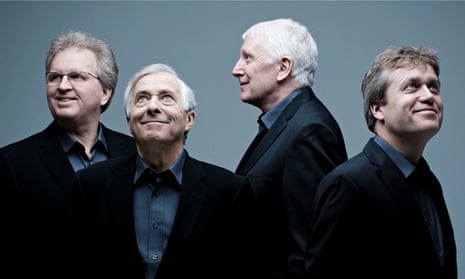The Hilliard Ensemble’s final farewell was always going to be an emotional occasion. Founded in 1973, the four-man vocal group has been as beloved by early-music aficionados as by living composers, and their haunting work with jazz saxophonist Jan Garbarek has long stood as a reproach to those who would compromise when bringing two musical genres together. Even if countertenor David James is the only survivor from the first concert, the line-up has been unaltered for 16 years, and the decision to stop before age made too much of a dent in the voices of the three older singers must have been a wrench.
Indeed, what came through consistently was how deeply entangled the four voices are, even while each singer retains his own individual tone. Blend and balance were instinctively, unerringly impeccable. In Perotin’s Viderunt Omnes – the first known work for four voices, written down more than 800 years ago – the dissonances at the end of each section resolved on to clear chords of startling purity, time after time.
Diction was so clear it was as if the words were spoken, which helped in a long narration from Luke’s gospel by Arvo Pärt, in which baritone Gordon Jones took the lead, and in Roger Marsh’s Death of Yorick, the group’s final commission, premiered last year. There was also Piers Hellawell’s luscious setting of words by the Elizabethan painter after whom the ensemble is named. The older works, which generally showed off the singers’ musicality best, included a memorable performance of Sheryngham’s sombre Ah, gentle Jesu, and several medieval carols for two or three voices. In duet, tenors Steven Harrold and Rogers Covey-Crump sounded like two halves of the same singer.
An entr’acte from I Went to the House But Did Not Enter, written in 2008 by Heiner Goebbels to exploit the Hilliards’ very ordinariness on stage, made an upbeat, snappily performed sign-off. But the encore, a simple arrangement of the Scottish song Remember Me My Dear, was poignancy itself.

Comments (…)
Sign in or create your Guardian account to join the discussion